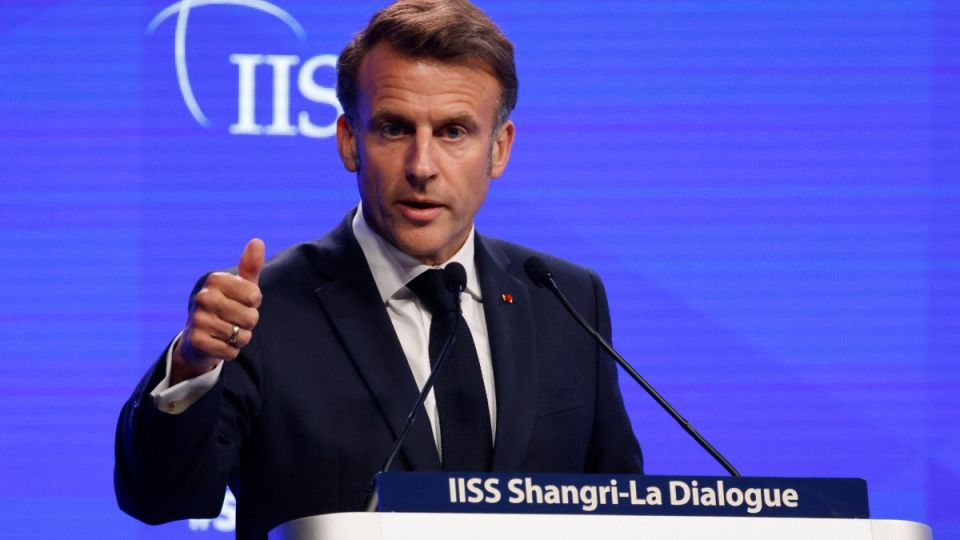June 2, 2025
SINGAPORE – As great powers loom large over the Indo-Pacific, the United States and France competed for clout at the region’s security forum in Singapore over the weekend.
In a ballroom full of senior officials from governments, militaries and diplomats around the world at the three-day Shangri-La Dialogue that was hosted by the International Institute for Strategic Studies (IISS), US Defense Secretary Pete Hegseth and French President Emmanuel Macron made their bold bids to court Indo-Pacific nations.
Speaking in his first-ever appearance at the annual forum, Hegseth gave an assurance that the US would work more closely with Indo-Pacific allies, calling the region its “priority theater,” and promising to step up joint defense cooperation with regional allies, including Japan and the Philippines.
“No one should doubt America’s commitment to our Indo-Pacific allies and partners,” he said. “We will continue to wrap our arms around our friends and find new ways to work together, not only our treaty allies here, but also our key defense partners in ASEAN and across the Indo-Pacific.”
He said the Donald Trump administration was pursuing a “common sense” approach to reestablishing deterrence in the face of a “real” threat from China that includes increasing the US military presence in the western Pacific, “helping allies and partners strengthen their defense capabilities” and “rebuilding our defense industrial bases”.
In his address, Hegseth made a direct appeal to Asian allies, challenging them to boost their defense spending and pointing to Europe as an example. “How can it make sense for countries in Europe to do that while key allies and partners in Asia spend far less in the face of a far more formidable threat from communist China, not to mention North Korea?” he said.
Hegseth’s speech contrasted starkly with the tone struck by Macron in his keynote address on Friday evening, during which the French president warned that intensifying US-China rivalry risked dividing the world into opposing camps and undermining global stability, urging Asian nations to resist being forced to choose sides.
Macron called for a “positive new alliance” between Europe and Asian countries anchored around principles of open trade and the “rules-based order”, not only in defense but also in technology, trade and climate, to avoid becoming “collateral victims of decisions made by superpowers”.
“The time for non-alignment has undoubtedly passed, but the time for coalitions of action has come and requires that countries capable of acting together give themselves every means to do so,” he said.
Macron’s keynote address marked the end of a week-long swing through Southeast Asia, where he shored up bilateral relationships with Vietnam, Indonesia and Singapore, in a sign of the region’s strategic importance amid uncertainties on global supply chains and trade.
ASEAN centrality
Warning against rising geopolitical orthodoxy and the risks of regional destabilization, Malaysian Prime Minister Anwar Ibrahim, in his special address on Saturday, called for a “dynamic equilibrium” built on openness and cooperation.
“And the more we act together, the harder it becomes to be pulled apart by external gravity. Preserving our autonomy is not about resisting others. It is about strengthening ourselves. This, in essence, is what ASEAN centrality is about,” he said.
Previously on Friday, Hegseth met with Southeast Asian defense leaders from Brunei, Cambodia, Indonesia, Laos, Malaysia, the Philippines, Singapore, Thailand and Timor-Leste, during which he reaffirmed the US commitment to working with and supporting the central role of ASEAN, his office said in a press release.
Regional tensions
In its pre-summit report called the “2025 Asia Pacific Regional Security Assessment”, the IISS noted that Trump’s return to the White House had “raised the level of anxiety among regional and global policymakers”.
Speaking on the sidelines of the forum on Saturday, Evan A. Laksmana of the IISS and editor of the report said Hegseth’s remarks were “certainly crystal clear that the US has strong commitments to stay within the region. In fact, so clear that the US would prefer that European partners stay in Europe.”
“For some, this might be a bit contradictory to what the message we’ve been hearing from Europe at the Shangri-La Dialogue over the last three years, that European partners and allies are trying to be in the region,” he added.
“Aside from clarity, it is the challenges and the gravity around major security crises, including in the Taiwan Strait, which the [US defense] secretary mentioned,” he said. “The concern about the US raising regional tension is certainly something that the rest of the region is looking out for.”
Beijing slammed Hegseth’s remarks, with its foreign ministry saying on its website on Sunday that he deliberately ignored calls for peace from countries in the region and that the US “kept stoking flames and creating tensions in the Asia-Pacific”.
China did not send any top defense ministry officials to the forum, dispatching instead a delegation from the People’s Liberation Army National Defense University.


